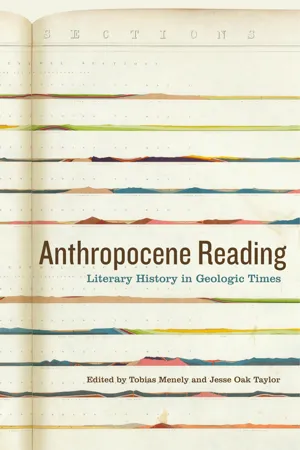
AnthropoScene
The SLSA Book Series
- English
- PDF
- Available on iOS & Android
About This Book
Few terms have garnered more attention recently in the sciences, humanities, and public sphere than the Anthropocene, the proposed epoch in which a human "signature" appears in the lithostratigraphic record. Anthropocene Reading considers the implications of this concept for literary history and critical method.
Entering into conversation with geologists and geographers, this volume reinterprets the cultural past in relation to the anthropogenic transformation of the Earth system while showcasing how literary analysis may help us conceptualize this geohistorical event. The contributors examine how a range of literary texts, from The Tempest to contemporary dystopian novels to the poetry of Emily Dickinson, mediate the convergence of the social institutions, energy regimes, and planetary systems that support the reproduction of life. They explore the long-standing dialogue between imaginative literature and the earth sciences and show how scientists, novelists, and poets represent intersections of geological and human timescales, the deep past and a posthuman future, political exigency and the carbon cycle.
Accessibly written and representing a range of methodological perspectives, the essays in this volume consider what it means to read literary history in the Anthropocene.
Contributors include Juliana Chow, Jeffrey Jerome Cohen, Thomas H. Ford, Anne-Lise François, Noah Heringman, Matt Hooley, Stephanie LeMenager, Dana Luciano, Steve Mentz, Benjamin Morgan, Justin Neuman, Jennifer Wenzel, and Derek Woods.
Frequently asked questions
Information
Table of contents
- COVER front
- Copyright Page
- Table of Contents
- Introduction
- Notes to Introduction
- Chapter 1: Anarky
- Notes to Chapter 1
- Chapter 2: Enter Anthropocene, Circa 1610
- Notes to Chapter 2
- Chapter 3: The Anthropocene Reads Buffon; or, Reading Like Geology
- Notes to Chapter 3
- Chapter 4: Punctuating History Circa 1800: The Air of Jane Eyre
- Notes to Chapter 4
- Chapter 5: Romancing the Trace: Edward Hitchcock’s Speculative Ichnology
- Notes to Chapter 5
- Chapter 6: Partial Readings: Thoreau’s Studies as Natural History’s Casualties
- Notes to Chapter 6
- Chapter 7: Scale as Form: Thomas Hardy’s Rocks and Stars
- Notes to Chapter 7
- Chapter 8: Anthropocene Interruptions: Energy Recognition Scenes and the Global Cooling Myth
- Notes to Chapter 8
- Chapter 9: Stratigraphy and Empire: Waiting for the Barbarians, Reading Under Duress
- Notes to Chapter 9
- Chapter 10: Reading Vulnerably: Indigeneity and the Scale of Harm
- Notes to Chapter 10
- Chapter 11: Accelerated Reading: Fossil Fuels, Infowhelm, and Archival Life
- Notesto Chapter 11
- Chapter 12: Climate Change and the Struggle for Genre
- Notes to Chapter 12
- Chapter 13: Ungiving Time: Reading Lyric by the Light of the Anthropocene
- Notes to Chapter 13
- Contributors
- Index